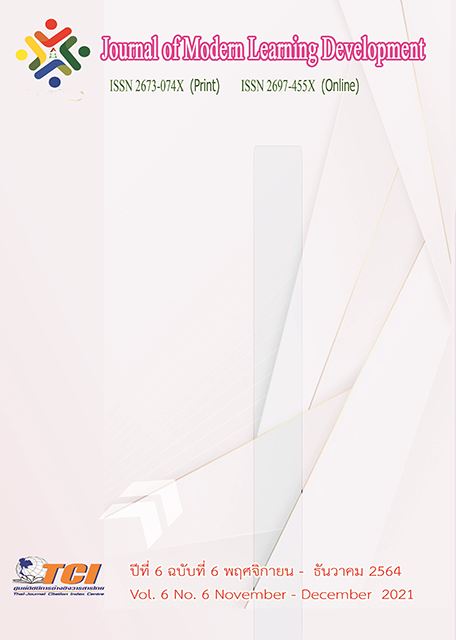Adjustment of the Informal Employment Under the Social Crisis a Case Study a Group of Taxi Drivers in Selaphum District, Roi Et Province
Main Article Content
Abstract
Subject research Adaptation of informal employment under the social crisis a caused study a group of taxi drivers in Selaphum District, Roi Et Province. Aims to study 1) To study the adjustment of informal workers under the social crisis caused by the COVID-19 epidemic 2) To study the conditions affecting the adjustment of informal workers under the social crisis caused by the COVID-19 pandemic and 3) to study the recommendations for the adjustment of informal workers groups under the social crisis caused by the COVID-19 epidemic. By using research tools Is an (In depth interview) with a group of 11 people that are selected Purposive sampling.
The results of the study showed that 1) In mostly cases, informal workers have economic and occupational adjustments. Is to save more household expenses. And making additional careers to generate. Physiological adjustment found that There is follow news. The Wearing a mask of Health Handing washing with hand sanitizer, alcohol and water after touching thing and psychological adjustment. 2) the conditions affecting the adjustment of informal workers is human capital, physical capital, social capital, and 3) Guidelines for reducing adaptation restrictions for informal workers under social crises should promote supplementary occupations suitable for workers mostly is the elderly. Relevant agencies should have health safety measures. And found that when informal workers can adjust economically and professionally and adjust physically will also lead to psychological adaptation.
Article Details
References
กันยา สุวรรณแสง. (2550). จิตวิทยาทั่วไป. กรุงเทพมหานคร: อักษรพิทยา.
กันต์กนิษฐ์ เกษมพงษ์ทองดี. (2546). ปัจจัยที่ส่งผลต่อการปรับตัวของนักศึกษาพยาบาลวิทยาลัยพยาบาล บรมราชชนนี จังหวัดนนทบุรี. ออนไลน์. สืบค้นเมื่อ 8 กันยายน 2563. แหล่งที่มา: https://webopac.lib.buu.ac.th/catalog/BibItem.aspx?BibID=b00212062
ชูทิตย์ ปานปรีชา. (2551). จิตวิทยาทั่วไป หน่วยที่ 9. (พิมพ์ครั้งที่ 21). กรุงเทพมหานคร: โรงพิมพ์ มหาวิทยาลัยสุโขทัยธรรมาธิราช.
ทีดีอาร์ไอ. (2564). วิเคราะห์ผลกระทบของโควิด-19 ต่อแรงงานนอกระบบ. ออนไลน์. สืบค้นเมื่อ 1 กุมภาพันธ์ 2564. แหล่งที่มา: https://tdri.or.th/2021/01/covid-106/
ธวัลกร อินอุตร. (2549). การปรับตัวจากผลกระทบ ของการเปลี่ยนแปลงสิ่งแวดล้อมของประชาชน ตำบลแม่ตาว อำเภอแม่สอด จังหวัดตาก. ออนไลน์. สืบค้นวันที่ 17 สิงหาคม 2563. แหล่งที่มา: https://kb.psu.ac.th/psukb/bitstream/2016/12480/1/420443.pdf
นนทกานต์ จันทร์อ่อน. (2556). การบริหารจัดการแรงงานนอกระบบของประเทศไทย (Management of Labour in the Informal sector in Thailand). ออนไลน์. สืบค้นวันที่ 4 สิงหาคม 2563. แหล่งที่มา: http://library. senate.go.th/document/Ext536 0/5360123_0002.PDF
วราภรณ์ ตระกูลสฤษดิ์. (2545). จิตวิทยาการปรับตัว. (พิมพ์ครั้งที่ 2). กรุงเทพมหานคร: ศูนย์ส่งเสริมวิชาการ.
สำนักข่าวอีไฟแนนซ์ไทย. (2563). UN ชี้โควิดกระทบแรงงานนอกระบบไทยมากขึ้นสุด คาดจำนวนแรงงานยากจนเพิ่มขี้น. ออนไลน์. สืบค้นวันที่ 17 สิงหาคม 2563. แหล่งที่มา: https://www.efinancethai. com/LastestNews/LatestNewsMain.aspx?release=y&ref=M&id=eG0zZUg1Q1ZQc2c9
สำนักงานปลัดกระทรวงแรงงานกระทรวงแรงงาน. (2554). แผนยุทธศาสตร์การบริหารจัดการแรงงานนอกระบบ พ.ศ. 2555-2559. ออนไลน์. สืบค้นเมื่อ 20 สิงหาคม 2562. แหล่งที่มา: https://www.mol. go.th/wpcontent/uploads/sites/2/2019/03/PlanStrategy_Labour5559Minister_Dec0811.pdf
สำนักงานสถิติแห่งชาติ. (2562). สำนักงานสถิติแห่งชาติ สำรวจแรงงานนอระบบ. ออนไลน์. สืบค้นวันที่ 19 สิงหาคม 2563. แหล่งที่มา: http://www.nso.go.th/sites/2014/Pages/News/2562/N08-07-62-1.aspx
สำนักงานสวัสดิการและคุ้มครองแรงงานจังหวัดเชียงใหม่. (2561). แรงงานนอกระบบ. ออนไลน์. สืบค้นเมื่อ 2 กันยายน 2563. แหล่งที่มา: http://chiangmai.labour.go.th/index.php/2018-10-31-08-11-28/408-2018-10-31-06-38-13
เสกสรร มรุลาภรังสรรค์. (2547) . องค์กรแห่งการเรียนรู้. ออนไลน์. สืบค้นเมื่อ 20 สิงหาคม 2562. แหล่งที่มา: https://kb.psu.ac.th/psukb/bitstream/2016/12480/1/420443.pdf


